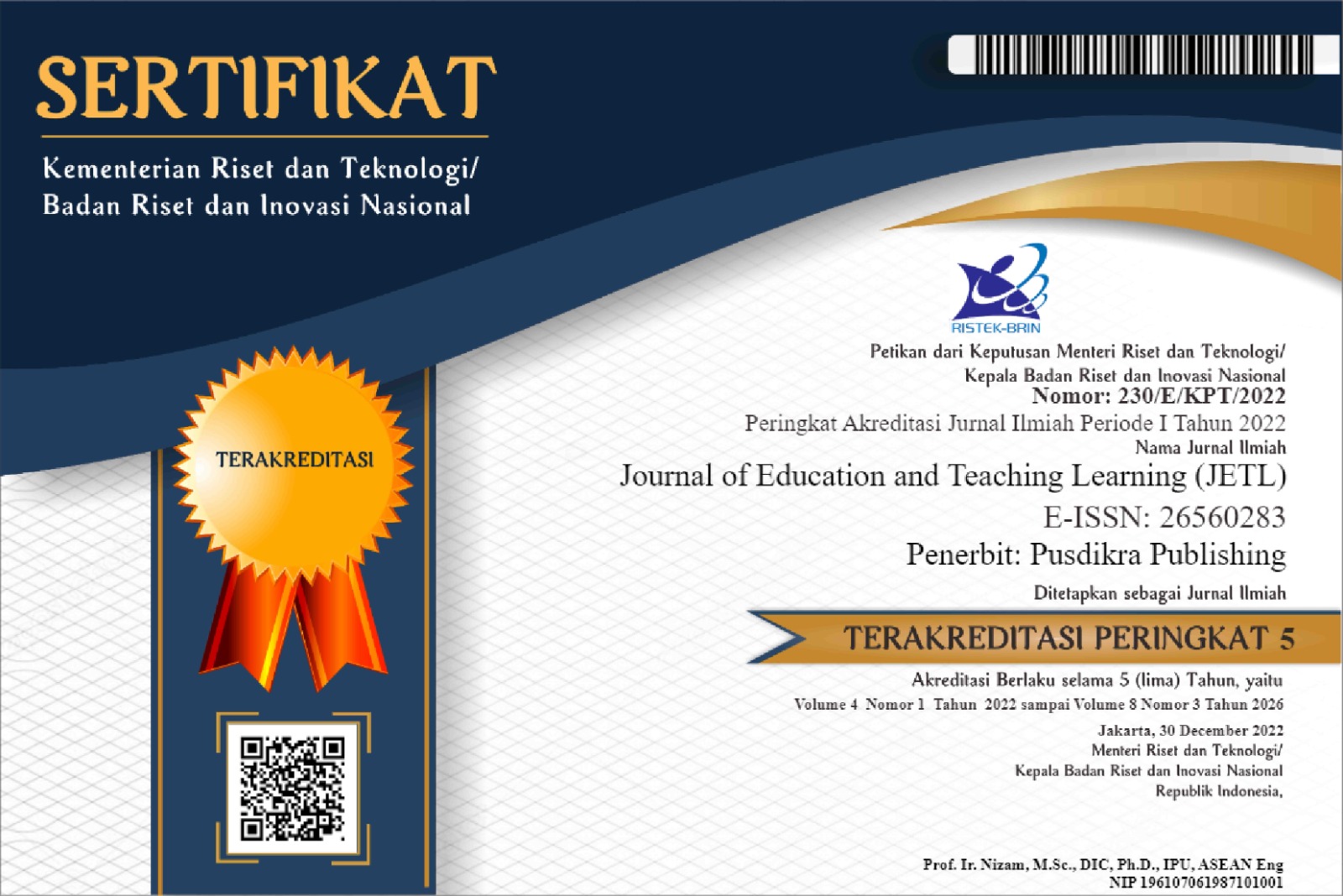Learning Style, Self-Regulated Learning, and Academic Resilience: Determinants of Creative Thinking Ability in SMAN 1 Waru Students
DOI:
https://doi.org/10.51178/jetl.v7i1.2278Keywords:
Learning style, Self Regulated Learning, Academic Resilience, Creative Thinking SkillsAbstract
The ability to think creatively is one of the main competencies that are urgently needed in the 21st century education era, especially in facing global challenges and competition in the Industrial Revolution 4.0. The study identified the influence of three main factors, namely learning style, self-regulated learning, and academic resilience on the creative thinking ability of grade XII students of SMAN 1 Waru in economics. The research uses a quantitative approach with a survey method, involving 50 students who are selected through random sampling techniques. Data collection was carried out through questionnaires to measure learning styles, self-regulated learning, and academic resilience, and essay tests to evaluate students' creative thinking skills. The results of regression analysis showed that learning style and academic resilience had a positive influence on creative thinking ability, but self-regulated learning did not show statistical significance. These results indicate the importance of a holistic approach to learning as well as collaboration between teachers, students, and the environment to optimize creative thinking in facing global challenges.
References
Anggela, M., Rasmawan, R., Lestari, I., Enawaty, E., & Sartika, R. P. (2022). Profil Keterampilan Berpikir Kreatif Siswa pada Materi Pemisahan Campuran. Edukatif?: Jurnal Ilmu Pendidikan, 4(5), 6832–6845. https://doi.org/10.31004/edukatif.v4i5.3138
Connor, K. M., & Davidson, J. R. T. (2003). Development of a new Resilience scale: The Connor-Davidson Resilience scale (CD-RISC). Depression and Anxiety, 18(2), 76–82. https://doi.org/10.1002/da.10113
David.G, C. (2008). Curriculum vitae Curriculum vitae Curriculum vitae Curriculum vitae. Cv, 1(loker), 28–30. www.sss.com
Hasmi, N., Zulfihani, H., & Majdi, M. Z. Z. (2024). Positif Self Talk. 2, 117–127.
Herva Herdianti, I. A., & Muntazhimah, M. (2023). Pembelajaran Era New Normal: Pengaruh Self Regulated Learning Terhadap Kemampuan Berpikir Kreatif Matematis Siswa SMP. AKSIOMA: Jurnal Program Studi Pendidikan Matematika, 12(1), 1263. https://doi.org/10.24127/ajpm.v12i1.6772
Kwen, K. M., & Lemba, V. C. (2024). Peningkatan Resiliensi Akademik Siswa melalui Konsep Diri dan Iklim Sekolah. SAP (Susunan Artikel Pendidikan), 8(3), 527. https://doi.org/10.30998/sap.v8i3.22045
Leonard, WIbawa, B., & Suriani. (2019). Model Dan Metode Pembelajaran Di Kelas.
Lesmanawati, Yunita, D. (2020). Jurnal basicedu. Jurnal Basicedu, 3(2), 524–532.
Maryani, I., Estriningrum, U., & Nuryana, Z. (2023). Self-Regulated Learning and Creative Thinking Skills of Elementary School Students in the Distance Education During the Covid-19 Pandemic. Creativity Studies, 16(2), 496–508. https://doi.org/10.3846/cs.2023.15278
Mashfufah, A., Dasna, I. W., & Utama, C. (2024). Community-Based Project Learning: Empowering Students’ Self-Regulated Learning and Creativity. European Journal of Educational Research, 13(2), 445–456. https://doi.org/10.12973/eu-jer.13.2.427
Milani Tri Subekti, G., & Yonisa Kurniawan, R. (2022). Pengaruh Self Regulated Learning. Self Efficacy Dan Motivasi Belajar Terhadap Hasil Belajar Peserta Dididk SMAANISDA. Sustainability (Switzerland), 7(1), 1–16. http://scioteca.caf.com/bitstream/handle/123456789/1091/RED2017-Eng-8ene.pdf?sequence=12&isAllowed=y%0Ahttp://dx.doi.org/10.1016/j.regsciurbeco.2008.06.005%0Ahttps://www.researchgate.net/publication/305320484_SISTEM_PEMBETUNGAN_TERPUSAT_STRATEGI_MELESTARI
Miller, G. E. (n.d.). of PSYCHOLOGY.
Németh, J., & Long, J. G. (2012). Assessing Learning Outcomes in U.S. Planning Studio Courses. Journal of Planning Education and Research, 32(4), 476–490. https://doi.org/10.1177/0739456X12453740
Papilaya, J. O., & Huliselan, N. (2016). Identifikasi Gaya Belajar Mahasiswa. Jurnal Psikologi Undip, 15(1), 56. https://doi.org/10.14710/jpu.15.1.56-63
Pratiwi, I., Yulianti, D., & Fitrianna, A. Y. (2018). Kemampuan Berpikir Kreatif Matematik Siswa MTs Ditinjau Dari Kemampuan Resiliensi Matematik Siswa. JPMI (Jurnal Pembelajaran Matematika Inovatif), 1(2), 171. https://doi.org/10.22460/jpmi.v1i2.p171-184
Priambodo, B., Listiara, A., & Astuti, T. P. (2013). Pengaruh dari Problem Posing Method Terhadap Kreativitas Verbal Siswa SMP Kelas VII. Jurnal Psikologi Universitas Diponegoro, 12(2), 109–120. https://ejournal.undip.ac.id/index.php/psikologi/article/view/8831
Putri, S. A. R. R., & Laksmiwati, H. (2022). Resiliensi akademik mahasiswa jurusan Psikologi Unesa saat perkuliahan daring pada masa pandemi. Character: Jurnal Penelitian Psikologi, 9(7), 27–35.
Putri, S., & Tambunan, E. P. (2023). The Effect Of Self-Efficacy And Self-Regulated Learning On Student’s Creativity In Biology Practicum. Jurnal Pembelajaran Dan Biologi Nukleus, 9(3), 707–716. https://doi.org/10.36987/jpbn.v9i3.5065
Rahayu, I., Suwarna, A. I., Wahyudi, E., Asfahani, A., & Jamin, F. S. (2024). Pendidikan Lingkungan Hidup dengan Membentuk Kesadaran Lingkungan dan Tanggung Jawab Sosial di Kalangan Pelajar. Global Education Journal, 2(2), 101–110. https://doi.org/10.59525/gej.v2i2.344
Refiyanti, N. A. D., & Miatun, A. (2022). Pembelajaran New Normal: Perbedaan Kemampuan Berpikir Kreatif Berdasarkan Tingkatan Self-Regulated Learning Peserta Didik SMA. Edumatica?: Jurnal Pendidikan Matematika, 12(02), 111–122. https://doi.org/10.22437/edumatica.v12i02.18908
Rizqi, S., Cahya Diartyani, A., Wahdani, A. S., Ramadhan, A. F., & Ekonomi, F. (2023). Self-Regulated Learning dan Lingkungan Kampus Sebagai Solusi Meningkatkan Minat Program Kreativitas Mahasiswa Bagi Mahasiswa Fakultas Ekonomi Universitas Negeri Yogyakarta Angkatan 2018-2020. 1(1), 1–12.
Rochmah, L., & Kurniawan, R. Y. (2022). Pengaruh Efikasi Diri Dan Lingkungan Belajar Terhadap Hasil Belajar Ekonomi Dengan Motivasi Belajar Sebagai Variabel Mediasi Di Masa Pandemi Covid 19. Edunomic Jurnal Pendidikan Ekonomi, 10(1), 68. https://doi.org/10.33603/ejpe.v10i1.6364
Suci Trismayanti. (2023). Strategi Guru dalam Meningkatkan Minat Belajar. 4(1), 88–100.
Supitri, E., Rohmah, M., Afifah, S., & Rusmiati. (2023). Pengaruh Self Regulated Learning Dan Motivasi Belajar Terhadap Hasil Belajar Peserta Didik Mata Pelajaran IPS di MTs Subulussalam Sriwangi. JECO: Journal of Economic Education and Eco-Technopreneurship, 2(1), 1–8. https://doi.org/10.30599/jeco.v2i1.495
Wanelly, W., & Fauzan, A. (2020). Pengaruh Pendekatan Open Ended dan Gaya Belajar Siswa terhadap Kemampuan Berpikir Kreatif Matematis. Jurnal Basicedu, 4(3), 523–533. https://doi.org/10.31004/basicedu.v4i3.388
Wardani, N. R., Juariah, J., Nuraida, I., & Widiastuti A, T. T. (2021). Meningkatkan kemampuan berpikir kreatif melalui penerapan model pembelajaran JUCAMA. Jurnal Analisa, 7(1), 87–98. https://doi.org/10.15575/ja.v7i1.9904
Zimmerman, B. J., & Schunk, D. H. (2013). Self-Regulated Learning and Academic Achievement: Theoretical Perspectives. Taylor & Francis. https://books.google.co.id/books?id=I2GQFz3v2T8C
Downloads
Published
How to Cite
Issue
Section
License
Copyright (c) 2025 Tria Budianti

This work is licensed under a Creative Commons Attribution-ShareAlike 4.0 International License.




